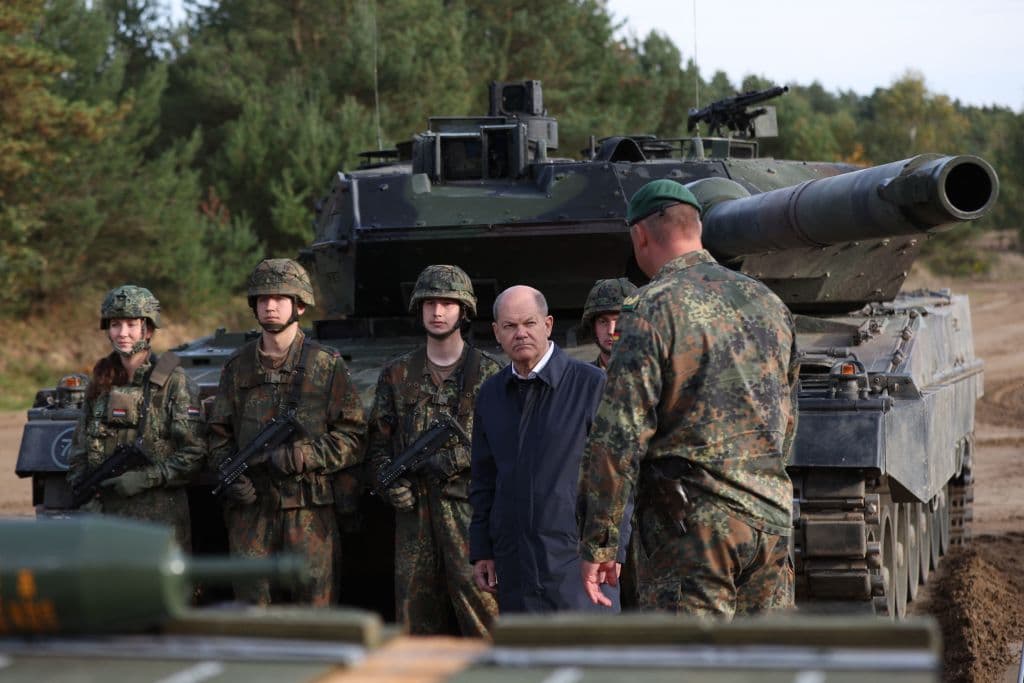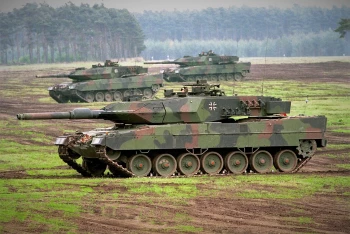9 European nations commit to upping defense aid to Ukraine as tension high over German Leopard decision

Nine European nations have signed a joint statement known as the Tallinn Pledge, committing to providing Ukraine with the support that it needs to liberate all its territory currently occupied by Russia.
The United Kingdom, Poland, Estonia, Latvia, and Lithuania were represented by their respective defense ministers at the meeting in the Estonian capital on Jan 19, while representatives from Denmark, the Netherlands, Czechia, and Slovakia were also present.
"We recognise that equipping Ukraine to push Russia out of its territory is as important as equipping them to defend what they already have," the statement said.
"By bringing together Allies and partners, we are ensuring the surge of global military support is as strategic and coordinated as possible. The new level of required combat power is only achieved by combinations of main battle tank squadrons, beneath air and missile defence, operating alongside divisional artillery groups, and further deep precision fires enabling targeting of Russian logistics and command nodes in occupied territory."
The announcement comes as all eyes remain on Germany, which promised its final decision on the delivery of German-made Leopard deliveries ahead of the next summit of Ukraine's defense partners at the U.S. air base in Ramstein, Germany on Jan. 20.
German arms manufacturing company Rheinmetall is reportedly ready to supply 100 battle tanks to Ukraine if the government approves, according to Handelsblatt, citing sources in the industry.
The company is ready to provide German-produced Leopard 1 and 2, as well as British-made Challenger 1, which Rheinmetall would buy from Oman and upgrade before sending to Ukraine.
Yet Germany has refused to send modern tanks to Ukraine, fearing "escalation", despite Poland and the U.K. both breaking the taboo of providing Western-made tanks to Ukraine. Chancellor Olaf Scholz said during the World Economic Forum’s annual meeting in Davos on Jan. 19. that Germany would only provide Leopards to Ukraine if the US provided native M1 Abrams tanks first.
Responding to Scholz's comments, Pentagon deputy press secretary Sabrina Singh said that "it doesn't make sense" for the U.S. to send Abrams tanks "at the moment".
In a Jan. 19 session of the Bundestag, MP Ditmar Nietan, member of Scholz's ruling Social Democratic Party, confirmed promises made earlier that Berlin would give its final decision at Ramstein.
Germany's stance on tank supplies to Ukraine withholds Finland, Spain, Portugal, and Poland from sending Leopards they have in stock. Since Leopards are produced by a German manufacturer, the government’s approval is necessary for handling these tanks outside NATO.
“Many countries want to provide tanks, but they wait for the documents from those countries which have the right to issue them (…) We are all looking forward to the green light of the country which has right to license such supplies,” Ukrainian president Volodymyr Zelensky said in a video address to the Davos forum, clearly referring to Germany.
Warsaw, which pledged a company of Leopard 2 tanks to Ukraine on Jan. 11, has indicated its frustration with Germany's hesistation. On Jan 19, Polish prime minister Mateusz Morawiecki indicated that Poland could send the tanks regardless of whether Berlin gives its official approval or not.
"Consent is a secondary issue here," he said in an interview to Polsat outside the forum in Davos. "We will either get it quickly or we will do the right thing ourselves."
Lithuanian Defense Minister Arvydas Anusauskas told Reuters that several more countries will defintely announce new Leopard deliveries to Ukraine at the Rammstein summit on Jan. 20.
The Tallinn Pledge did not include any new tank announcements other than those of Poland and the U.K., though it said that Slovakia is looking at "possibilities related to main battle tank (deliveries)".










